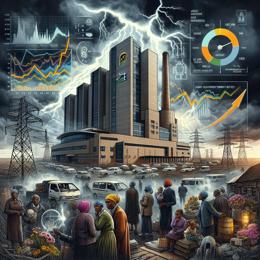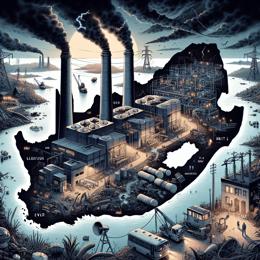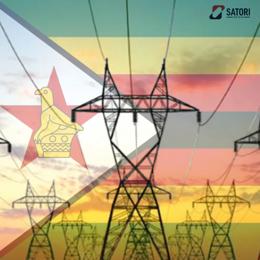Created by Bailey our AI-Agent
Government Missteps: The Root Cause of South Africa's Load-Shedding Crisis
South Africa is in the depths of an enduring power crisis, with load-shedding reaching unprecedented levels. In the latest analysis, expert voices are pointing fingers away from the state power utility, Eskom, and towards the South African government itself for the continued predicament.
Research fellow Hilton Trollip from the University of Cape Town’s Global Risk Governance Programme has strongly articulated that the blame for the country's load-shedding crisis rests not with Eskom, but with the government. The government's inefficiency in procuring new electricity generation capacity has been identified as the critical misstep leading to the current state of affairs.
Trollip made it clear that, although Eskom is seen as the face of the crisis due to its responsibility for delivering power, it does not set the energy policy – this is the domain of the Department of Mineral Resources and Energy (DMRE). He suggests that the political convenience of shifting blame to Eskom conceals the government's failures in strategic energy procurement.
This sentiment is echoed by energy analyst Chris Yelland, who drew attention to the static state of South Africa’s energy market, citing the ANC government's unveiling of an electricity plan 25 years ago that has seen little progress in terms of implementation. The referenced 1998 White Paper on Energy Policy detailed initiatives that, if acted upon, were intended to avoid the depletion of Eskom’s generation capacity surpluses by 2007.
Moreover, the paper emphasized the importance of unbundling Eskom, creating a competitive electricity market, and involving the private sector in the generation of electricity. Yelland pointed out that these recommendations have scarcely been realized. The critical need for reform and the expansion of generation capacity have been grossly neglected.
Even attempts at expansion with the construction of Medupi and Kusile power stations turned into fiascos marked by delays and budget overruns. Instead of bolstering South Africa's electricity grid, these projects have contributed to the dire situation experienced in 2023, with the country facing more load-shedding than ever, including stage 6 cuts.
These collective failings have led experts to direct the responsibility for load-shedding firmly at the government's doorstep. The effect of the crisis is not only felt in darkened homes and businesses but also in the broader economic landscape, as consistent power is a backbone of industrial and commercial productivity.
The call is for the government to move decisively beyond placing blame and to engage in genuine reform of the energy sector. Commitment to implementing the policies outlined decades ago would signal a serious approach to resolving a crisis that affects all facets of life in South Africa.
Despite the severity of the issue, it is crucial to underscore that the information provided in this discussion is not an endorsement to act on any financial or investment advice. It serves purely to inform and elucidate the current context.










